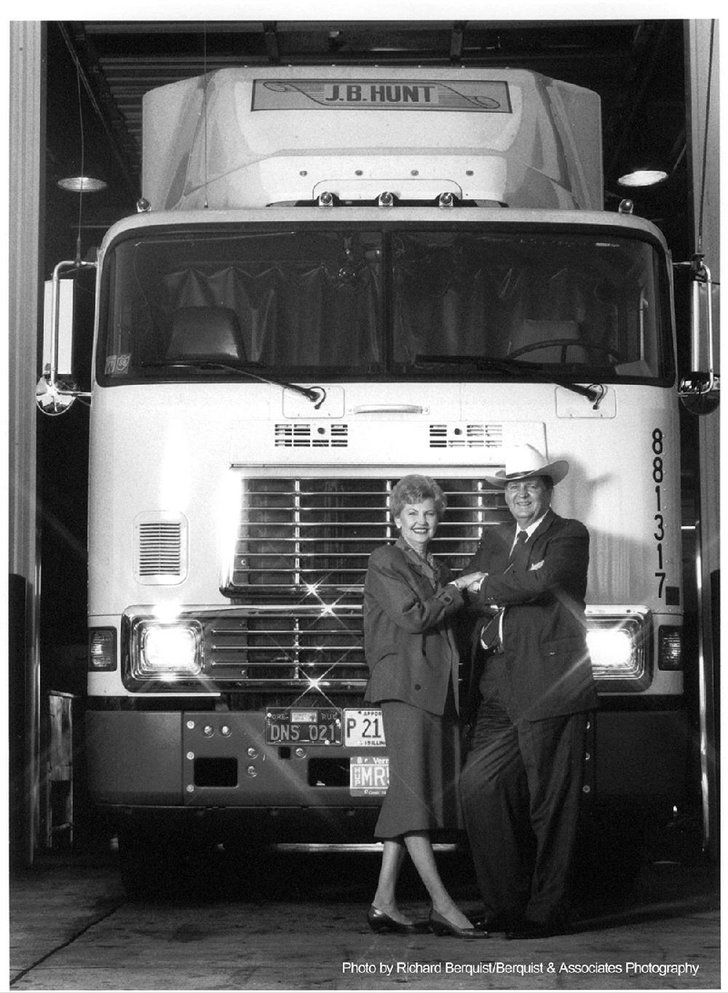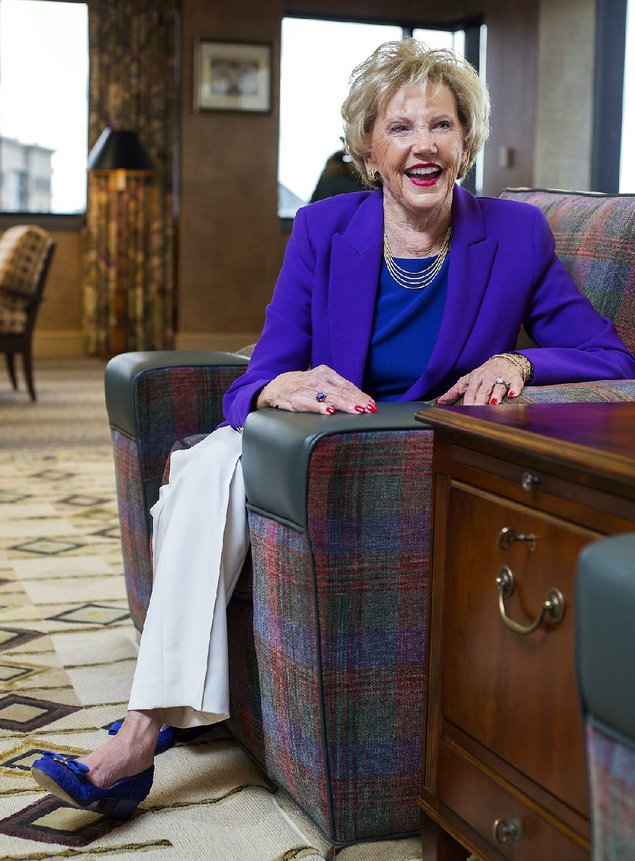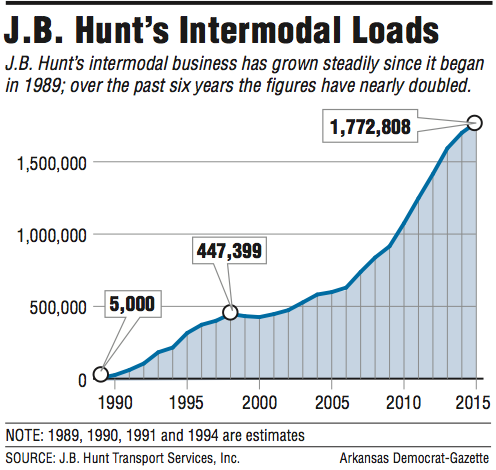The J.B. Hunt Story
J.B. Hunt Transport is the Fortune 500 trucking company based in Lowell, Arkansas that comprises a large part of my beat coverage. Its late founder is being inducted into the Supply Chain Hall of Fame tomorrow (alongside Henry Ford and Malcolm McLean) for his industry-changing deal with the Santa Fe Railway Company, which made intermodal transportation work for the first time.
I heard from his widow and business partner Johnelle Hunt for the occasion, as well as many others from the company and industry about how intermodal happened, and why it's such a big deal. It's a long story, but trust me, a lot shorter than I could have written, given all that people wanted to say on the subject.
Over the few hours I spent interviewing Mrs. Hunt, 84, I learned a great deal about her husband, the early days of trucking in NW Arkansas and that she has an admitted weakness for shoes (as her husband had one for cowboy hats). We also realized that in fact, one could argue she helped create my job, since the paper has a reporter covering each of the three Fortune 500 companies and their industries here: Walmart, Tyson Foods and J.B. Hunt.
One thing was clear from our conversation: she's a tough businesswoman. Though she is reportedly worth over $2 billion, when J.B. suddenly died she came out of retirement in her mid 70s to take over his real estate development company, Hunt Ventures. (At the time he was involved in close to 90 projects.)
We spoke in the penthouse office he had designed, which remains much as he left it, featuring panoramic views, much memorabilia and "J.B. Hunt" embedded in the marble floors. I was, therefore, surprised when she said she's thinking about moving. When I asked why, she replied, "Well, we have about 16,000 square feet here, and we don't need this much space. I can rent that out for a lot!"
J.B. Hunt to be bestowed hall of fame seat
Widow recalls speedbumps, triumphs of trucking firm
September 25, 2016




Johnnie Bryan Hunt was a truck driver in Little Rock when he suggested to his wife, Johnelle, that he quit to start a new business in Stuttgart. Tired of being home alone, she made him promise one thing: "that we will never own another truck."
She tells the story with a laugh because years later, in 1969, Johnnie Hunt bought five tractors and seven trailers. J.B. Hunt Transport Services Inc., the company it has become, last year boasted $6.2 billion in revenue, making it the fourth-largest for-hire trucking company in the country. Forbes currently ranks Johnelle Hunt as the fifth-wealthiest self-made woman in the U.S.
One of the reasons for the growth was J.B. Hunt's partnership with the Santa Fe Railway Company in 1989, the first successful venture in intermodal transportation between the rival industries. The idea was to share freight between the modes to maximize the long-haul efficiency of rails with the short-haul capabilities of trucks.
Kirk Thompson, then president and current chairman of the J.B. Hunt board, called it "one of the best decisions in the history of J.B. Hunt Transport." Johnelle Hunt dubbed it "our golden goose."
The foresight and willingness to take an expensive risk earned Johnnie Hunt a spot in the Council of Supply Chain Management Professionals' inaugural Supply Chain Hall of Fame class. The criteria for admission? Supply chain professionals who have "changed the world we live in," said Brian Hancock, a member of the council's board and chairman of the hall of fame development committee.
He will be inducted alongside Henry Ford, the founder of Ford Motor Co., and Malcom McLean, the developer of the modern shipping container and a friend of Johnnie Hunt.
Though Johnnie Hunt died in 2006, Johnelle Hunt and their two children will attend the the council's annual conference in Florida to accept the award on his behalf Tuesday.
"J.B. Hunt said, 'I'm willing to forgo my driver, truck and trailer and share that with the railroad, because I think it's more valuable for the U.S. economy and my customers,'" said John Kent, director of the supply chain management research center at the Walton College of Business at the University of Arkansas in Fayetteville. "It was really risky for anyone in a trucking company to go out on that limb and disrupt the trucking business. Most of us humans won't do it, but for entrepreneurs, it's part of being an entrepreneur."
"Sometimes I would say, well he never did go to school and learn that you can't do it," Johnelle Hunt said of her husband's entrepreneurialism. Johnnie Hunt, one of seven children raised during the Great Depression in Cleburne County, started school at age 4 but dropped out in seventh grade. The 10-year-old had to go to work cutting timber at his uncle's sawmill.
Soon, he met Johnelle, a 16-year-old from Heber Springs. By age 21, Johnnie Hunt was trying to design a way to package and distribute wood shavings for poultry litter.
"I'm in high school, and he has me typing letters to manufacturers," Johnelle Hunt recalled.
She continued as his partner in business and life until his death and afterward. The Arkansas Business Hall of Fame inducted them as a couple in 2001. At the company she was very involved, collecting debt, keeping the books and paying bills. When Johnnie Hunt died suddenly, she came out of retirement to take the helm of his real estate development company, Hunt Ventures.
In the beginning, though, he drove trucks out of Texarkana and Little Rock while she stayed with their children. When he came home, he would "sit at the table and draw and draw and draw," trying to design the machine to package the wood shavings, she said.
"He always was thinking. His education was driving those trucks all those years, because he had so much time alone."
While driving through Stuttgart, he noticed people burning rice hulls and decided to find a way to sell that byproduct instead. No one had ever managed to find a way to pack them because rice hulls are difficult to compress. Johnnie Hunt eventually did, and the family moved to Stuttgart where, in 1961, they founded J.B. Hunt Co.
Their first year in business they lost $19,000. Ignoring advice to close up shop, the Hunts kept going.
"We never lost any money in the rice hull business after that. We got up the next day, and we just kept working," Johnelle Hunt said.
Eight years later, at the advice of Hudson Foods founder Red Hudson, Johnnie Hunt made that first purchase of tractors and trailers to haul poultry to the West Coast. After a bank loan, the Hunts were officially back in the trucking business, and they moved to Northwest Arkansas.
They did not sell the rice hull business until 1983, when the company went public. It remains in operation today, still using the same machines Johnnie Hunt designed and patented.
"The first 10 years of the trucking company were really a struggle," Johnelle Hunt said. "Everything we touched didn't turn to gold, and everything we did didn't work, but we always tried to make it work. When you know the path you're going down is not working, though, you have to know when to stop."
"With any innovative company, there will always be things you try that don't work. That's just par for the course with being innovative. The key is to find out how to maintain a degree of resilience that allows you to keep on moving," said Terry Esper, associate professor in the department of supply chain management at the Walton College.
Johnelle Hunt agreed, saying resilience and lack of fear of failure were key to her late husband's success.
"We knew if it all failed we could go back to where we were and be happy," she said. "I think that's the secret -- don't be afraid. Because if you're afraid of losing, you'll never make it."
When the trucking industry deregulated in 1980, Johnnie Hunt and others were able to take advantage of the free market. When the company went public in 1983 "millionaires were made in one trading day," his son Bryan wrote in a letter marking his father's retirement from the company in 2005.
Then Michael Haverty from the Santa Fe Railway Co. approached Johnnie Hunt with a new idea. Haverty had written a thesis in business school about how a railroad and a trucking company should team up to provide door-to-door deliveries, but when he first promoted the idea, people said, "this guy doesn't understand that railroad companies and trucking companies hate each other," Haverty recalled.
At that time, as today, the two industries competed intensely for freight. Haverty was confident in the logic of the idea that capitalized on the two industries' strengths.
After visiting them in Lowell in 1988, he invited Johnnie Hunt and then-President Kirk Thompson to see how it could work by riding a passenger car on a freight train from Chicago to Kansas City.
"We got down to Galesburg, Ill., and J.B. walked over to me and said, 'Haverty, we've got a deal.' I said, 'What's the deal?' He said, 'I don't know, but we're going to do it,'" Haverty recalled.
The deal began with a handshake in October 1989, and they signed the official contract in June 1991.
"We were both determined it was going to work, and we told our people to make sure that it did work," Haverty said.
Despite the overhead cost of new containers and equipment to enable the transitions from tractor to rail, "After a year of business there was $30 million worth of revenue. Today, BNSF [Railway] makes $1 billion annually from that handshake," Haverty said.
Last year, J.B. Hunt Transport made about $3.7 billion in revenue from its intermodal segment, comprising about 1.8 million loads and about 60 percent of its total business.
"This deal changed the entire landscape of long-haul freight transportation in America," Thompson said. "Many truckers and truck lines scoffed at this new operation and said we would fail. Thinking outside the box ultimately led to one of the best decisions in the history of J.B. Hunt Transport."
Haverty also faced skepticism from his peers, though it quickly faded. He was inducted to the National Railroad Hall of Fame, which is housed in Galesburg, due to its history as the site of that handshake in 1989.
"There's not anybody in the trucking or rail industries, as far as intermodalism is concerned, more deserving of a hall of fame [than J.B. Hunt]," said Haverty. "He was an entrepreneurial individual. His gut told him when things would work."
"It's interesting," explained Matthew Waller, dean of the Walton College and founding chair of the supply chain management department. "If you look at companies historically, when they focus on delivering value to customers, they wind up doing these things that seem counterintuitive."
According to Bryan Hunt, chief operating officer at the time, when he questioned why the company should turn over freight to their railroad competitor, his father responded, "The customer wants the best for the least, and that's what the railroad and us can do."
The deal would have macroeconomic effects, too. Kent explained that in 1980 about 18 percent of the U.S. economy was attributed to inventory and transportation costs.
In 2015, that number was down to 8.5 percent, he said. "A significant portion of that is because we've put trailers on the railroad."
J.B. Hunt's commitment to entrepreneurialism and prioritization of customers seem to remain at the company today.
"The thing that I know for sure about J.B. Hunt is that they really pride themselves on being innovative," said Esper. "It's not just because they think of these ideas; it's because they have a culture that encourages them."
President and Chief Executive Officer John Roberts said the company is "extremely fortunate to have had Mr. Hunt as our founder. His entrepreneurial legacy lives on at our company and continues to motivate us to achieve greatness."
Esper said students with work experience at the company "are much more attuned to the issues out there and are looking at those issues in a much more innovative way."
Esper is an officer at the council and has been involved with the group for 20 years.
"This honor is something we should be particularly proud of in Arkansas," he said. "There was an entire field to choose from, and his contributions were deemed worth recognizing in its inaugural class."
"I think it's a representation of the kind of people we produce here in Arkansas."
Johnelle Hunt said that while she and her husband thought about quitting, they never thought about moving from Arkansas.
When they used to do investor "road shows" to present the company to potential shareholders, "The first thing he would say, is 'We are from Lowell, Ark. -- the center of the universe,'" Johnelle Hunt recalled. "And Lowell wasn't even on the map yet."
SundayMonday Business on 09/25/2016
Print Headline: J.B. Hunt to be bestowed hall of fame seat